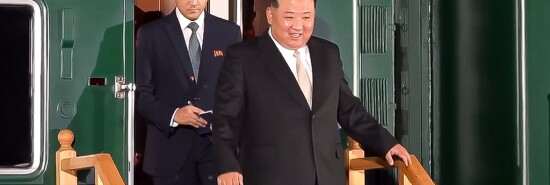
How Kim Jong Un’s Russia trip illustrates his security paranoia
Tom Rogan
Video Embed
Concluding his short visit with President Vladimir Putin in far eastern Russia, North Korean leader Kim Jong Un will be happy with how things went.
Alongside a tour of the Vostochny Cosmodrome and ensuing banquet, the North Korean leader was feted in a manner that Putin applies only to his most valued partners. Putin pledged support for Kim’s priority interest in strengthening his satellite program. Because of the rocket technology needed to put satellites in orbit, Russia is also likely to facilitate Kim’s ballistic missile program. In return, Kim offered his “hope that we will always stand together in fighting imperialism.”
WHY ARE SO MANY HIGH-LEVEL CHINESE OFFICIALS DISAPPEARING
We now wait to see what weapons or equipment North Korea provides to Russia for its struggling war against Ukraine.
Yet Kim’s visit was also notable for the extraordinary security measures he employed.
This was most evident with the armored train Kim used to travel the few hundred miles to meet with Putin outside of Vladivostok. As underlined by his frequent and sometimes vicious purges of senior officials, Kim is obsessed with ensuring his supreme authority at home. As shown by his ballistic missile and nuclear activities, Kim is equally keen to broadcast strength abroad. The intersection of those priorities means that Kim fears the potential of both foreign and domestic assassins. Using a train offers a greater probability of safety than a plane, which might suffer an accidental or Prigozhinesque, not-so-accidental technical failure. A plane, Kim fears, might also be shot down by a rogue North Korean pilot or air defense unit. Or perhaps by the CIA.
Still, Kim’s train wasn’t the only illustration of his security paranoia. Video of Kim’s tour of the Cosmodrome shows his bodyguards in a constant state of nervous hyperactivity, clearly uncomfortable with the Russian security arrangements. As Kim departed, two of his protection officers even guarded against any threat from Putin and his security detail! This led Putin’s SBP security detail, which is understandably on edge at present, to tighten up around him.
Why such obsessiveness?
Well, as Michael Madden has outlined, Kim’s protection officers aren’t normal government bodyguards. They are headquartered in the Central Party Office No. 6 and formed by Korean People’s Army soldiers. Selected for their familial and ideological loyalty to the Kim dynasty, these officers undergo often life-threatening training in physical endurance and combat methodologies. They are imbued with a near-theological imperative to protect Kim and his family at all costs. Failure of any kind (including embarrassing Kim) isn’t just unacceptable. It’s likely lethal for an officer and his family.
CLICK HERE TO READ MORE FROM THE WASHINGTON EXAMINER
Befitting their service of a totalitarian state, Kim’s bodyguards are not terribly keen about the free press. During then-President Donald Trump’s June 2019 visit to the Korean Demilitarized Zone, Kim’s bodyguards aggressively obstructed journalists from covering a meeting between Trump and Kim. Then-White House press secretary Stephanie Grisham was injured as she forced access for the media. When Trump later made a brief crossing into North Korea, Kim’s guards were a vision of tranquility. But when Kim entered South Korea, his bodyguards again aggressively pushed journalists and Secret Service agents away from their leader.
Top line: Kim may want to broadcast his indefatigable authority, but his bodyguards underline the paranoia at the heart of his rule.
